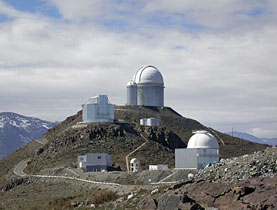Cameras locate ten new planets

Swiss astronomers have confirmed the existence of ten new planets orbiting stars outside the Earth's solar system.
Geneva University’s Euler telescope in Chile was used to back up initial sightings by the British-run SuperWASP observation system, astronomers announced on Tuesday.
“The significance is that it is a lot of planets in a very short amount of time,” Amaury Triaud, from the university’s Geneva Observatory team, told swissinfo.
In the past six months ten new extrasolar planets had been found using technology created by SuperWASP, a consortium of eight academic institutions.
The newly discovered planets vary in size. They are made of gas and are located close to their parent stars.
SuperWASP used robotic cameras located in the Canary Islands and South Africa to track the planets as they passed in front of a star, causing its light to dim temporarily.
“A lot to learn”
The astronomers say using cameras to detect planets while in transit is faster than traditional methods of tracking in which a planet’s gravitational pull is studied.
About 45 extrasolar planets have been discovered by cameras since 2004 while about 230 were detected in the past 13 years by other methods.
Tracking the planets by camera also allows astronomers to deduce the size and mass of each planet. The smallest of the ten new planets is 160 times the size of Earth, and the largest is about 2,650 times bigger.
Triaud said the speed at which the new planets had been detected showed that the SuperWASP project was working well and a large amount of sky was being observed.
Each newfound planet is observed by astronomers at the Nordic Optical Telescope on La Palma, the Swiss Euler Telescope in Chile and the Observatoire de Haute Provence in France, where precision instruments are used to confirm or reject the discovery.
The Geneva Observatory team will now follow up the planetary surveys and fine-tune the observations to find out more about each transiting planet, its radius and parent star.
Triaud added: “What’s also surprising is that within the ten planets that the SuperWASP found there is a huge variety. It’s more diverse than we could have thought before.
“There’s a lot we can learn.”
swissinfo, Jessica Dacey
Extrasolar planets are planets outside our solar system that orbit parent stars.
The first extrasolar planet was discovered by Swiss astronomers Michel Mayor and Didier Queloz from the Geneva Observatory in 1995. More than 270 extrasolar planets have since been found.
The planets have masses of between 0.5 and 8.3 times that of Jupiter, the largest planet in our solar system.
Most extrasolar planets have been discovered by scientists detecting their gravitational influence on the star they orbit. The process can take months and to speed it up, SuperWASP (Wide Angle Search for Planets) technology has cameras that watch for events known as transits where a planet passes in front of a star and blocks some of its light.
Two SuperWASP cameras monitor the sky compiling data which astronomers then check for transits or possible planets. Each newfound planet is then verified at observatories in the Canary Islands, Chile and France and the discovery is confirmed or rejected.
SuperWASP comprises Cambridge University, the Instituto de Astrofisica de Canarias, the Isaac Newton Group of telescopes, Keele University, Leicester University, the Open University, Queen’s University Belfast and St Andrew’s University.

In compliance with the JTI standards
More: SWI swissinfo.ch certified by the Journalism Trust Initiative












You can find an overview of ongoing debates with our journalists here . Please join us!
If you want to start a conversation about a topic raised in this article or want to report factual errors, email us at english@swissinfo.ch.